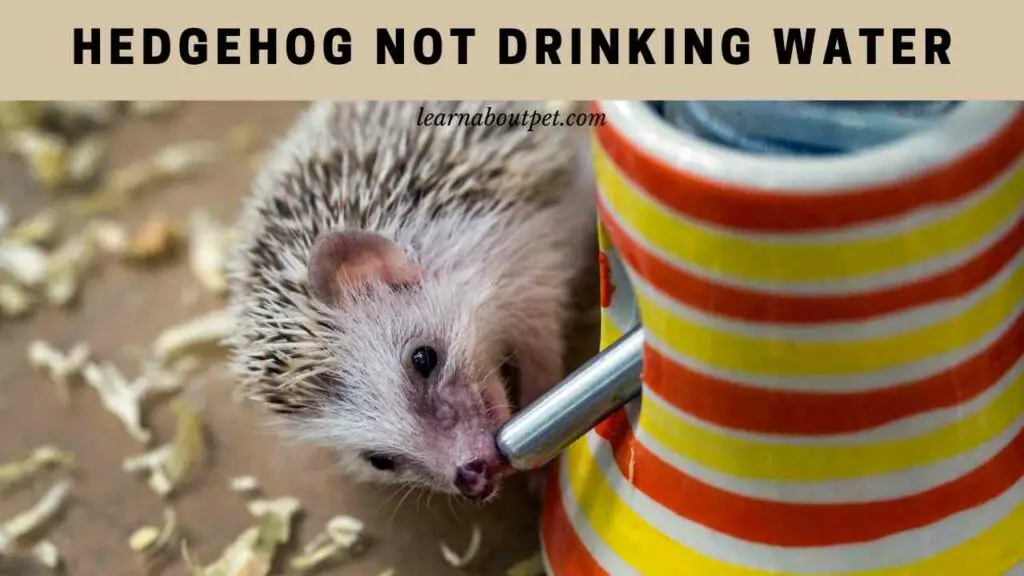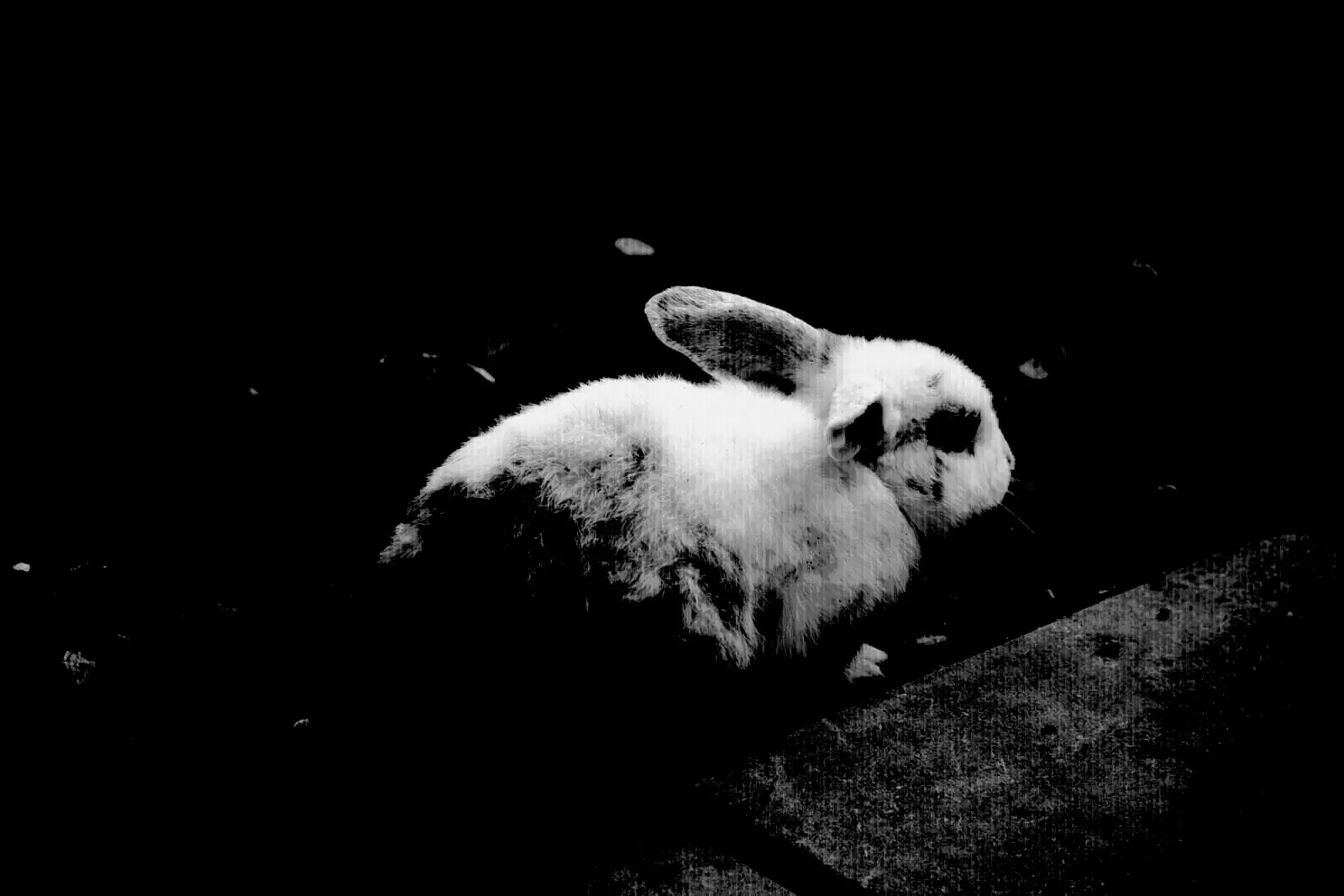As a hedgehog owner, one of the most disturbing discoveries you can make is that your hedgie is not drinking water. Upon making this discovery, you will have several questions. You will want to know why the hedgehog is not drinking water, how long the hedgie can go without water and what you need to do, to get the hedgie drinking water again. Read on, to find answers to all those questions.
Is your hedgehog not drinking water? It may mean that the hedgehog has an upset stomach that is affecting its appetite for both food and water. It may also mean that you are presenting the water to the hedgie in a manner that makes it hard to drink. Or if it is a new hedgehog, it may be still too shy to drink in front of you. There could also be something stressing the hedgie, and making it not want to drink water. Or it could be ill.

Then again, the hedgie may be drinking water: only that you aren’t noticing it doing so. Or the hedgehog may be drinking water, but in quantities so small that you don’t notice it. If the hedgie is truly not drinking water, there are measures you can take to get it drinking again.
These may be things as simple as changing the diet or getting rid of things that are stressing the hedgie. Also changing the way you present the water may be helpful. If everything fails, it is best to consult a vet about the hedgie’s condition.
Do Hedgehogs Drink Water?
Before proceeding with a discussion on the case of a hedgehog not drinking water, we need some foundational information. And in that regard, perhaps a good place to start is by finding out whether hedgies drink water, in the first place.
After all, thanks mainly to their spikes, these come across as very exotic, hardy animals that may not need to drink water. So, indeed, do hedgehogs drink water? And the answer, as it turns out, is ‘yes’, hedgehogs do drink water.
Actually hedgehogs require quite a bit of water to survive and thrive. Without water, a hedgie’s health – and indeed life – may be at risk. Therefore we can assert that hedgehogs require water. The upshot is that a hedgehog not drinking water is not a normal thing. It is something that requires attention.
Do Hedgehogs Drink A Lot Of Water?
Yet another foundational question, before proceeding to discuss the case of a hedgehog not drinking water, is that of whether hedgies drink a lot of water. So, indeed, do hedgehogs drink a lot of water? The answer is mostly ‘no’. Hedgies don’t drink a lot of water. But they do require some water.
The amount of water that a hedgie may drink within a day may be somewhere in the 1 to 1.5 teaspoon range. Thus you are looking at something in the 25 to 30 ml range.
This is to say that a hedgehog drinking a lot of water may not be a very usual thing. Indeed, the question on why is my hedgehog drinking a lot of water is almost just as common as the one on why is my hedgehog not drinking water? So the hedgie’s water requirement is modest. But it does nonetheless require some water, to continue doing well health-wise.
How Often Do Hedgehogs Drink Water?
Someone who has a hedgehog not drinking water is likely to be interested in knowing how often these animals drink water. So, indeed, how often do hedgies drink water? The answer is that hedgies drink water as they become thirsty. That is as opposed to drinking on a set schedule.
And this is why they always need to have water around: so that when thirst arises, they can proceed to gulp it down.
Giving a precise answer (in terms of a specific number of times) to this question – on how often hedgehogs drink water is hard. This question is not as simple as, say, the one on can hedgehogs drink beer or are hedgehogs nocturnal? The best we can say, with regard to how often hedgies can drink water is that ‘it is as often as they get thirsty’.
This may be as less frequently as once per day, or as frequently as thrice a day. But they just drink when they get thirsty.
Sometimes, it can prove to be very hard to actually catch a hedgie drinking water. This is possibly why pictures of hedgehogs drinking water seem to be quite few and far apart. The upshot is that many of the people who complain that their hedgies are not drinking turn out to be under false impressions.
So proper checking often reveals that the hedgies are drinking: only that their owners are not actually managing to catch them doing it.
How Long Can A Hedgehog Go Without Water?
It is highly likely that anyone with a hedgehog not drinking water will want to know how long these creatures can go without water. That is what leads to the question: how long can hedgehogs go without water? And the answer is that hedgies can’t go for very long without water.
Ideally, a hedgie shouldn’t go for more than a day without water. This is because hedgies are prone to complications like fatty liver disease, if they go for too long without food or water.
That means if you have a hedgie that has gone for more than a day or two without water, you have reason to worry. One of the things you learn, while studying how to take care of a hedgehog, is to ensure that it has a good supply of food and water. But the challenge arises when you discover that giving the hedgie a constant supply of water is quite different from getting it to actually drink the water.
In the final analysis though, the most a hedgie can safely go without water is one day. The hedgie may require little water. But if that little water isn’t available, it can cause very major issues.
Hedgehog Not Drinking Water – What Are The Possible Reasons?
The commonest reason for a hedgehog not drinking water is an upset stomach. This may be due to an abrupt diet change. Or it may be due to the hedgie having eaten something that is not proper for it.
The mechanism is one where the upset stomach causes the hedgie to lose appetite – both for food and water. So if you are trying to find out why won’t my hedgehog eat or drink, this may be the most likely reason.
If you present the water in the wrong manner, the hedgie may not be able to drink it. For instance, if your bottle has an opening that is awkward for the hedgie, it may be hard for it to drink the water in it. Or if the water you present to the hedgie is too cold, it may not drink it.
- Some illnesses can also cause the hedgie to lose appetite: both for food and for water.
- Stress is another thing that can cause a hedgie to stop drinking water.
- Being in a new place can also make a hedgie stop drinking water (and eating) temporarily.
So those are some of the key possible reasons for hedgehog not drinking water.

New Hedgehog Not Drinking – What Are The Possible Reasons?
If you have a new hedgehog not drinking water, the reason behind it may be the stress of being in a new place. Notice hedgehog shaking behavior to understand their stress level. This often causes new hedgehogs to stop drinking water (and eating) for several days, until they acclimatize.
The new hedgehog may also be experiencing shyness. So because it is yet to get used to you, it is unable to drink in your presence. But when you go away, it proceeds to drink the water to its fill.
Further, the new hedgehog may not be used to the type of water bottle you use. Or if it is coming from a breeder, it may find the type of water (say, normal tap water) you use strange. So it may not drink it: at least for the first few days.
Hedgehog Not Drinking Or Eating – What Are The Possible Reasons?
In this case, there may be something affecting the hedgehog’s appetite. This may be an illness, stress, trauma, internal parasite infection or something else along those lines. Because of the effect on the hedgie’s appetite, it ends up not being in a position to eat or drink.
Hedgehog Not Drinking Water – What To Do?
First of all, you need to be sure that the hedgie is indeed not drinking water. It may be drinking, only that you are not catching it actually drinking. This then leads to an interesting question on how do I know if my hedgehog is drinking water? And the answer is that the best way of doing so is by placing a marker on the hedgie’s water bottle. Then fill water up to that mark.
If the next time you check the water has gone to below the mark, it would mean that the hedgie has indeed drunk the water.
Conversely, if it is clear that the hedgehog is truly not drinking water, you may consider changing its diet. For instance, a shift from cat food to the specially formulated hedgehog food may get it drinking water again.
If there was a recent diet change, and the hedgie has not been drinking water since then, you may consider switching back to the old food for a while. Then introduce the new diet more gradually.
Where the hedgie not drinking water is due to stress (as evinced by green poop), you may need to identify the stressors. Then get rid of them, so that the hedgie can go back to its normal eating and drinking habits.
If the problem seems to be the water bottle, you may consider switching to another. Or you may swift from a water bottle to a water dish.
In the meantime, to ensure that the hedgie doesn’t experience severe dehydration, you can consider ‘forcefully’ watering it using a syringe.
If your best efforts don’t seem to bear fruit, consult a vet urgently. The hedgie may be ill: in which case it will need treatment, before it can start drinking normally again.
How Do I Get My Hedgehog To Drink Water?
You need to start by trying to figure out the core reason behind the hedgehog not drinking water. Where it is due to an upset stomach, consider changing the diet. Where it is due to stress, figure out what the stressors are, and eliminate them. In the cases where it is due to how you present the water, make the necessary changes.
Ensure that the water is at the right temperature. Consider changing your water bottle, or shifting altogether from the bottle to a water dish. Where it is due to an illness, have a vet treat the hedgie.
How Do I Get My Hedgehog To Drink More Water?
This, in other words, is a question on how to make my hedgehog drink water in larger quantities. In most cases, all you have to do to make the hedgie drink more water is change its diet.
For instance, change from cat food to the specially formulated hedgehog food. Also consider changing how you present the water. For instance, shift from very cold water to slightly warmer water. Get rid of any stressors that may be affecting the hedgie’s drinking – things like too low temperatures, lots of noise and so on.
While at it, ensure that you are realistic in the amount of water you expect the hedgie to drink. Don’t expect a hedgie to drink as much water as, say, a cat. As noted earlier, something in the one (or one and a half) teaspoon per day is adequate for a hedgie. So if your hedgie is drinking that much, you shouldn’t be expecting it to drink even more.
Final Verdict – Hedgehog Not Drinking Water
Is your hedgehog not drinking water? It may be on account of an upset stomach. It may also be due to stress or due to the way in which you are presenting the water. But a hedgehog not drinking water at all may also be a sign of a serious underlying illness.
Still, you want to be sure that the hedgie is indeed not drinking. This is because it may be drinking, but in quantities so modest (or at times so odd) that you don’t notice.

Where it is clear that the hedgie is indeed not drinking, you may consider changing its diet – in favor of something that encourages better water drinking. Or where the problem seems to be stress, you may need to identify the stressors, and eliminate them.
At other times, all you may need to do is change the water bottle or shift from a water bottle to a water dish, in order to get the hedgie drinking again. Where the problem seems to persist, it may be best to have the hedgie seen by a vet immediately.
As a pet lover, make sure to learn about pet more and give your pet hedgehog a good and comfortable life!

Welcome to Learn About Pet. My name is Rajkumar Ravichandran and I love all pets, travel, and amazing food. I write about my passion and personal experience caring for multiple pets in this blog! ❤️
Post Disclaimer
DISCLAIMER: THIS BLOG OR WEBSITE, "Learn About Pet", DOES NOT PROVIDE YOU WITH MEDICAL ADVICE AND IS NOT A SUBSTITUTE FOR MEDICAL ADVICE. ALWAYS GET IN TOUCH WITH YOUR PERSONAL VETERINARIAN AND USE INFORMATION HERE AS GENERAL ADVICE.
The information, including but not limited to, text, graphics, images and other material contained on this website are for informational purposes only. No material on this site is intended to be a substitute for professional veterinary advice, food recommendation, diagnosis, or treatment. Always seek the advice of your veterinarian or other qualified health care provider with any questions you may have regarding a medical condition or for pet food related questions.







